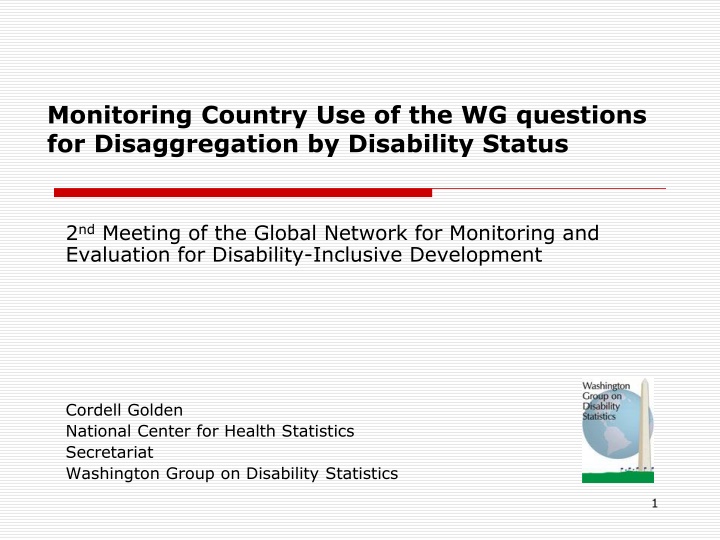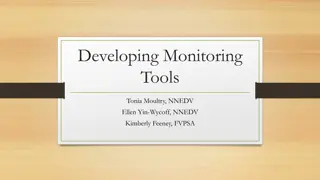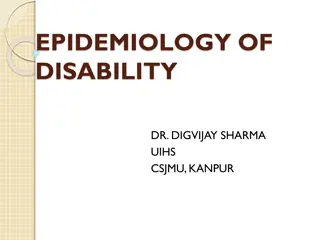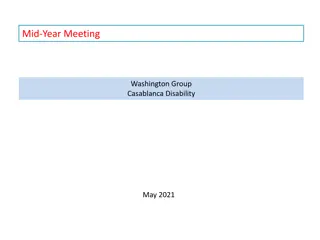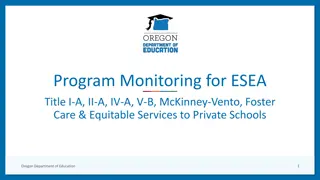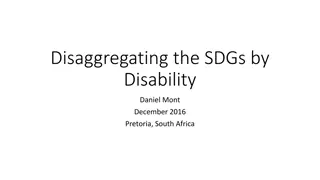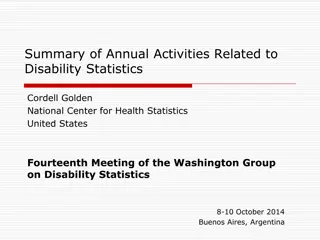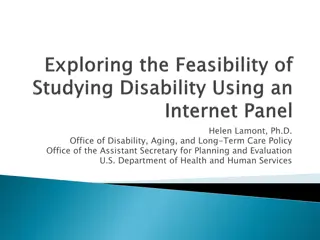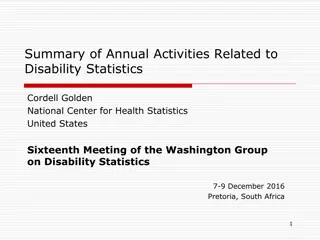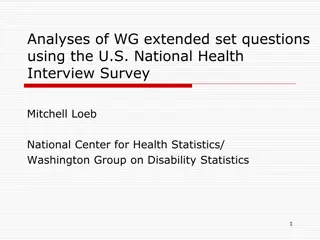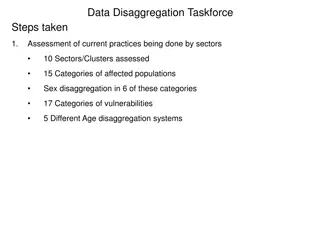Monitoring Use of WG Questions for Disability Disaggregation
The Washington Group (WG) was established to address the need for population-based measures of disability and to incorporate disability into national statistical systems. Representatives from National Statistical Offices (NSOs) form the main constituency of the WG, with approximately 135 countries as members. WG Country Reports provide insights into planned data collection efforts on disability, including details on surveys, data collection dates, sample designs, and languages administered. The monitoring of WG questions began in 2006, with enhancements over the years to capture disability prevalence rates more effectively.
Download Presentation

Please find below an Image/Link to download the presentation.
The content on the website is provided AS IS for your information and personal use only. It may not be sold, licensed, or shared on other websites without obtaining consent from the author.If you encounter any issues during the download, it is possible that the publisher has removed the file from their server.
You are allowed to download the files provided on this website for personal or commercial use, subject to the condition that they are used lawfully. All files are the property of their respective owners.
The content on the website is provided AS IS for your information and personal use only. It may not be sold, licensed, or shared on other websites without obtaining consent from the author.
E N D
Presentation Transcript
Monitoring Country Use of the WG questions for Disaggregation by Disability Status 2ndMeeting of the Global Network for Monitoring and Evaluation for Disability-Inclusive Development Cordell Golden National Center for Health Statistics Secretariat Washington Group on Disability Statistics 1
The Washington Group (WG) June 2001: UN International Seminar on the Measurement of Disability WG established as a City Group under the aegis of the UN Statistical Commission to: address the need for population based measures of disability foster international cooperation in the area of health and disability statistics produce internationally tested measures to monitor status of persons with disability incorporate disability into national statistical systems Representatives from National Statistical Offices (NSOs) comprise the main constituency of the WG ~135 countries are currently registered as members 2
Annual Report on National Activities Related to Disability Statistics - Country Reports Part of WG Governance Each country representative is responsible maintaining communications with other parties in their country who have expressed an interest in the work of the WG Provides a vehicle for a larger group of experts to have input into WG activities o Country report form distributed to countries with a designated WG representative o Summary of information collected is presented at the annual WG meeting o 3
Items included on WG Country Reports Report on planned data collection efforts on disability scheduled within next 3 years: o Type: Census Short disability module in ongoing survey Longer disability module / disability survey o Name of survey/census and administering agency o Date of data collection o Frequency o Sample design: Coverage / Sample size / Sampling frame o Mode o Language(s) administered o Administrative Records 4
WG Country Reports: Questions related to use of WG questions Began monitoring the use of WG questions in 2006 o In 2009, added question to capture information on the use of WG questions in 2010 census round o 2011-2013, included table shells to report disability prevalence rates by geographical division, age, sex o In 2015, expanded the questionnaire format: Use of WG Extended Set on Functioning (ES-F) Use of WG SS on surveys that also collect the following information: School attendance Employment status Information and Communications Technology (ICT) usage and access o 5
2015 WG Country Reports: Responding Countries (n= 57) Africa/Middle East (12): Afghanistan, Botswana, Burundi, Egypt, Israel, Kenya, Lesotho, Pakistan, Palestine, Tunisia, Uganda, Yemen Asia/Pacific (11): Australia,China, Japan, Korea, Maldives, Mongolia, New Zealand, Philippines, Samoa, Singapore, Thailand Europe (24): Armenia, Austria, Belarus, Croatia, Cyprus, Czech Republic, Denmark, Finland, France, Germany, Hungary, Ireland, Italy, Kosovo, Latvia, Lithuania, Montenegro, Netherlands, Poland, Romania, Slovakia, Spain, Sweden, Turkey North/South America (10): Aruba, Canada, Costa Rica, Dominican Republic, Jamaica, Mexico, Montserrat, Panama, Peru, United States 6
Monitoring the use of the WG Short Set and Extended Set on Functioning 7
WG Short Set Questions Adopted in 2006 o Question set that focus on measuring difficulty functioning in universal, basic activities o Domains of functioning: Vision, Hearing, Mobility, Cognition, Self-care, and Communication o Response categories: No difficulty; Some difficulty; A lot of difficulty; Cannot do at all o 8
WG Short Set Questions Because of a Health problem: 1) Do you have difficulty seeing even if wearing glasses? 2) Do you have difficulty hearing even if using a hearing aid? 3) Do you have difficulty walking or climbing stairs? 4) Do you have difficulty remembering or concentrating? 5) Do you have difficulty with (self-care such as) washing all over or dressing? 6) Using your usual language, do you have difficulty communicating (for example understanding or being understood by others)? Response categories: No difficulty; Some difficulty; A lot of difficulty; Cannot do at all 9
Countries using the WG short set or some variant in the most recent census cycle* (n=41) Argentina Aruba Bangladesh Brazil Burundi Cambodia Chad Croatia Dominican Republic Fiji Ireland Israel Italy Ivory Coast Jamaica Kazakhstan Kosovo Malawi Montenegro Montserrat Mozambique Netherlands Antilles Oman Pakistan Palestine Panama Paraguay Peru Philippines Qatar Romania Rwanda St. Maarten South Africa Sri Lanka Tanzania Tunisia Turkey Uganda Vietnam Zimbabwe 10 *Based on information obtained from 2009 - 2015 country reports
Countries using the WG short set or some variant in the most recent census cycle* Date of most recent census 2007 Palestine Peru 2011 Croatia Ireland Italy Jamaica Kosovo Montenegro Montserrat Romania South Africa Turkey 2008 Burundi Israel 2010 Aruba Dominican Republic Panama 2014 Tunisia Uganda 11 *Based on 2015 country reports
Countries indicating that the WG short set was included on previous censuses, national surveys, disability modules or pre-tests* (n=55) Afghanistan Argentina Armenia Aruba Bangladesh Bermuda Brazil Burundi Cambodia Canada Chad Croatia China China (Hong Kong SAR) Dominican Republic Egypt Estonia Fiji France Iran Ireland Israel Ivory Coast Japan Jordan Kazakhstan Kenya Kosovo Latvia Malta Mexico Mongolia Montserrat Mozambique Netherlands Oman Palestine Panama Paraguay Peru Philippines Poland Qatar Rwanda Samoa St. Maarten South Africa Sri Lanka Thailand Turkey Uganda United Arab Emirates United States Yemen Zambia 12 *Based on information obtained from 2009 - 2015 country reports
Have you used the short set of Washington Group questions on a survey that also collects information on any of the following items? School attendance Afghanistan Dominican Republic Israel Mexico Palestine Panama Peru Poland Samoa South Africa Thailand Turkey Uganda United States Employment status Afghanistan Dominican Republic Egypt Ireland Israel Mexico Palestine Panama Peru Poland Samoa South Africa Thailand Turkey Uganda United States ICT access and usage Afghanistan Ireland Israel Peru Samoa Thailand Uganda United States 13
WG Extended Set on Functioning (ES-F) Adopted in 2010 Expands on the Short Set, adding information on upper body functioning, affect, pain and fatigue and adding more questions per domain Begins to explore the association between functioning and the environment: use of assistive devices/aids, and functioning with and without assistance Full set: 37 questions covering 10 domains WG ES-F: http://www.cdc.gov/nchs/data/washington_group/wg_extended_question_ set_on_functioning.pdf 14
Countries indicating that the WG extended set on functioning was included as a module on a national survey or as part of a disability survey* Dominican Republic Finland (subset included on 2014 EHIS) Kosovo Samoa United States 15 *Based on information obtained from 2015 country report
Upcoming national data collection activities related to disability statistics 16
Type of data collection Census (16): Australia, Botswana, Burundi, Croatia, Egypt, Ireland, Kosovo, Lesotho, Mongolia, Montserrat, Pakistan, Palestine, Peru, Samoa, Tunisia, Yemen Short Disability Module (16): Australia, Austria, Botswana, Canada, Costa Rica, Egypt, Finland, Germany, Israel, Kosovo, Lithuania, Netherlands, South Africa, Turkey, Uganda, United States Longer Disability Module (11): Australia, Canada, China, Costa Rica, Czech Republic, France, Ireland, Kenya, Samoa, Thailand, United States Other (17): Afghanistan, Aruba, Belarus, Burundi, Croatia, Denmark, Finland, Hungary, Italy, Japan, Maldives, Mexico, Mongolia, New Zealand, Peru, Poland, Slovakia 17
Data collection activities specified countries indicating Other Income/Expenditure Survey (Afghanistan, Aruba) Living Standards Survey (Afghanistan, Belarus) Demographic Health Survey (Burundi, Maldives) Registry (Croatia) Published reports (Denmark, Mongolia) Microcensus (Hungary) Population and Household Online Database (Mongolia) European Health Interview Survey (Italy, Poland, Slovakia) Undetermined (Japan) 18
Date of most recent or upcoming data collection 2017 Australia* Canada* Denmark Finland* Germany Palestine Peru Thailand 2019 Poland Samoa* Tunisia 2016 Aruba Australia* Burundi Canada* Denmark Egypt Finland* France Hungary Ireland Israel* Lesotho Maldives Mexico* Netherlands Pakistan Samoa* Turkey Uganda United States 2014 Australia* Yemen 2015 Afghanistan Australia* Austria Canada* China Costa Rica Denmark France Israel* Italy Mongolia* South Africa 2020 Mongolia* 2021 Botswana Montserrat 2018 Australia* Czech Republic Finland* Lithuania Mexico* *Multiple data collection activities scheduled 19
Use of WG Questions for Disaggregation by Disability Status 20
Monitoring the UN CRPD and SDGs through data disaggregation WG question sets are developed to collect internationally comparable data based on the ICF model, and can be used to fulfill the monitoring requirements established by the UN Convention on the Rights of Persons with Disabilities and the Sustainable Development Goals. 21
Mainstreaming disability statistics WG questions can be added to any on-going data collections; Can be used in any national or subnational survey (health, labor force, income & expenditure, DHS, MICS etc.) Once the WG questions become integrated into core statistical systems disaggregating outcomes (education, employment etc.) by disability status becomes routine 22
SDG disaggregation by disability status Feasibility pilot project Assess the ability of NSOs to disaggregate SDG indicators by disability status Request sent to WG membership: Instructions and template for reporting on select SDGs by disability status Data sources used to produce SDG indicator Questions and response categories used to determine disability status Results to be complied in a report to be posted on WG website 23
For more information about the WG: www.cdc.gov/nchs/washington_group.htm Questions: WG_Secretariat@cdc.gov 24
